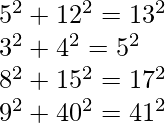Fermat’s Last Theorem
Last Updated :
23 Jun, 2022
According to Fermat’s Last Theorem, no three positive integers a, b, c satisfy the equation,  for any integer value of n greater than 2. For n = 1 and n = 2, the equation have infinitely many solutions.
for any integer value of n greater than 2. For n = 1 and n = 2, the equation have infinitely many solutions.
Some solutions for n = 1 are,
2 + 3 = 5
7 + 13 = 20
5 + 6 = 11
10 + 9 = 19
Some solutions for n = 2 are,

C++
#include <bits/stdc++.h>
using namespace std;
void testSomeNumbers(int limit, int n)
{
if (n < 3)
return;
for (int a=1; a<=limit; a++)
for (int b=a; b<=limit; b++)
{
int pow_sum = pow(a, n) + pow(b, n);
double c = pow(pow_sum, 1.0/n);
int c_pow = pow((int)c, n);
if (c_pow == pow_sum)
{
cout << "Count example found";
return;
}
}
cout << "No counter example within given"
" range and data";
}
int main()
{
testSomeNumbers(10, 3);
return 0;
}
|
Java
import java.io.*;
class GFG
{
static void testSomeNumbers(int limit, int n)
{
if (n < 3)
return;
for (int a = 1; a <= limit; a++)
for (int b = a; b <= limit; b++)
{
int pow_sum = (int)(Math.pow(a, n)
+ Math.pow(b, n));
double c = Math.pow(pow_sum, 1.0 / n);
int c_pow = (int)Math.pow((int)c, n);
if (c_pow == pow_sum)
{
System.out.println("Count example found");
return;
}
}
System.out.println("No counter example within given"+
" range and data");
}
public static void main (String[] args)
{
testSomeNumbers(12, 5);
}
}
|
Python3
def testSomeNumbers(limit, n) :
if (n < 3):
return
for a in range(1, limit + 1):
for b in range(a, limit + 1):
pow_sum = pow(a, n) + pow(b, n)
c = pow(pow_sum, 1.0 / n)
c_pow = pow(int(c), n)
if (c_pow == pow_sum):
print("Count example found")
return
print("No counter example within given range and data")
testSomeNumbers(10, 3)
|
C#
using System;
class GFG {
static void testSomeNumbers(int limit, int n)
{
if (n < 3)
return;
for (int a = 1; a <= limit; a++)
for (int b = a; b <= limit; b++)
{
int pow_sum = (int)(Math.Pow(a, n)
+ Math.Pow(b, n));
double c = Math.Pow(pow_sum, 1.0 / n);
int c_pow = (int)Math.Pow((int)c, n);
if (c_pow == pow_sum)
{
Console.WriteLine("Count example found");
return;
}
}
Console.WriteLine("No counter example within"
+ " given range and data");
}
public static void Main ()
{
testSomeNumbers(12, 3);
}
}
|
PHP
<?php
function testSomeNumbers($limit, $n)
{
if ($n < 3)
for($a = 1; $a <= $limit; $a++)
for($b = $a; $b <= $limit; $b++)
{
$pow_sum = pow($a, $n) + pow($b, $n);
$c = pow($pow_sum, 1.0 / $n);
$c_pow = pow($c, $n);
if ($c_pow != $pow_sum)
{
echo "Count example found";
return;
}
}
echo "No counter example within ".
"given range and data";
}
testSomeNumbers(10, 3);
?>
|
Javascript
<script>
function testSomeNumbers(limit, n)
{
if (n < 3)
return;
for (let a = 1; a <= limit; a++)
for (let b = a; b <= limit; b++)
{
let pow_sum = (Math.pow(a, n)
+ Math.pow(b, n));
let c = Math.pow(pow_sum, 1.0 / n);
let c_pow = Math.pow(Math.round(c), n);
if (c_pow == pow_sum)
{
document.write("Count example found");
return;
}
}
document.write("No counter example within given"+
" range and data");
}
testSomeNumbers(12, 5);
</script>
|
Output: No counter example within given range and data
Time Complexity: O(m2logn) , where m is the limit
Auxiliary Space: O(1)
Please suggest if someone has a better solution which is more efficient in terms of space and time.
Share your thoughts in the comments
Please Login to comment...